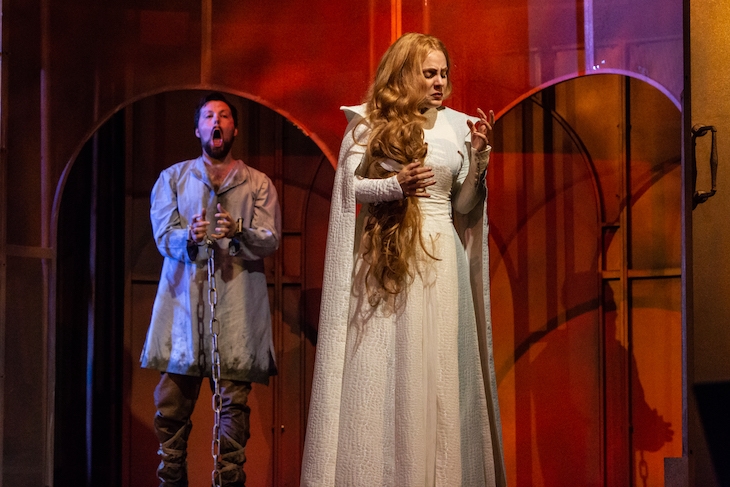I’ve been trying to pinpoint the exact moment when it became impossible to take Mascagni’s Isabeau seriously. It wasn’t when the scenery jammed, leaving half the cast briefly trapped inside a revolving tower. These things happen, after all: you simply suppress thoughts of Spinal Tap and re-suspend disbelief. I don’t think it was the entry of a character called Ubaldo of Edinburgh either, though people were definitely starting to snigger. It wasn’t even the bit when Mascagni, called upon to depict a trotting horse orchestrally, deployed what sounded like a pair of coconut shells. A score that had started as a weak but listenable slice of art-nouveau medievalism descended — clip clop, clip clop! — into pure Monty Python and the Holy Grail.
None of that exactly helped, however, and Isabeau needs all the help it can get. It looks promising on paper: the composer of Cavalleria rusticana goes Pre-Raphaelite, and serves up a foamy draught of high-flown piety spiked with a double shot of titillation. Princess Isabeau is too chaste to choose a suitor, so her father the king forces her to ride, Godiva-like, naked through the city. Meanwhile the mysterious forester Folco has quietly impressed Isabeau by summoning a hawk from the heavens to perch on her hand — which, as seduction strategies go, certainly tops a two-for-one deal at Pizza Express.
The music’s a bit heavy on fanfares, but between bouts of sub-Puccini splurge, Mascagni does find some poetry: the sequence in which the hawk descends, to sweeping harps and swirling woodwinds, is fantastic. Act One ends on a note of high anticipation and the prospect of the leading lady getting her kit off. And then Mascagni and his librettist Illica (the man behind Tosca and Madama Butterfly, clearly having an off-day) simply shrug, abort a love duet before it’s started and cut the whole thing dead with a choral mêlée and an ending that’s as sadistic as it is perfunctory. Big melodies? Showstopping arias? Spoiler alert: don’t get your hopes up.
Opera Holland Park has thrown an excellent cast at this mess. David Butt Philips’s tenor has rarely sounded darker or more expressive than as Folco, even if he couldn’t quite power through some of Mascagni’s blowsier climaxes (I hesitate to blame the conductor Francesco Cilluffo, who’s done some fine things in this repertoire). Philips made a bluff, charismatic love interest for Isabeau — the radiant French soprano Anne Sophie Duprels, lavishing gleaming, tightly-spun tone on her all-too-rare moments of ecstasy, and delivering her dying words while being held almost upside-down by a trio of vaguely allegorical monks who, in one of the director Martin Lloyd-Evans’s few gestures at insight, had been stalking her silently since Act One.
So any lack of chemistry can be attributed principally to Mascagni. Duprels’s exquisite hanging high note as Isabeau accepted her destiny with Folco was one of the most maddeningly unfulfilled promises I’ve experienced from any opera composer. As for the look of the thing, imagine a touring production of Camelot. It’s never advisable to get too tricksy with an unknown opera, but this was dressing-up box medievalism. The silver hawk puppet provided a brief flash of magic amid gurning peasants, a king in a big gold crown (Mikhail Svetlov, pleasingly sonorous while sitting on a throne and shouting) and crude toytown sets. Isabeau’s au naturel horse ride was replaced with an extended scene change.
Well, the heart has its reasons, and no-one disputes that Opera Holland Park’s revivals of rare Italian repertoire are labours of genuine love. Leoncavallo’s Zazà last season (also starring Duprels) was terrific, and apparently the entire run of Isabeau has already sold out. So hopefully it can do no harm to say that the opera’s a misshapen dud and the production is embarrassingly dated. It’s destined for New York, where it will probably go down a storm.
It’s unlikely that Anna Meredith would ever write anything quite so problematic, and Five Telegrams, her commission for the first night of the Proms, was a perfect pièce d’occasion. Sakari Oramo conducted the BBC Symphony Orchestra and the National Youth Choir in five movements that scrolled through all the currently admissible tonal idioms: minimalist ostinatos, Eric Whitacre-ish choral warbling, and dissonant, Messiaen-lite climaxes, augmented by bands of young brass players stationed antiphonally around the Albert Hall and making a heroic noise. An electronic light show made sure you didn’t listen too hard.
The main choral movement was based on telegram forms used by first world war soldiers on the western front, but no legible text was provided and you couldn’t decipher a word. Still, box ticked. The concert had opened with an unscheduled performance of Flourish with Fireworks by the late Oliver Knussen — a controlled explosion of refined sonic colour, perfectly chosen as a tribute but to be honest, a bit unfair on Meredith.






Comments